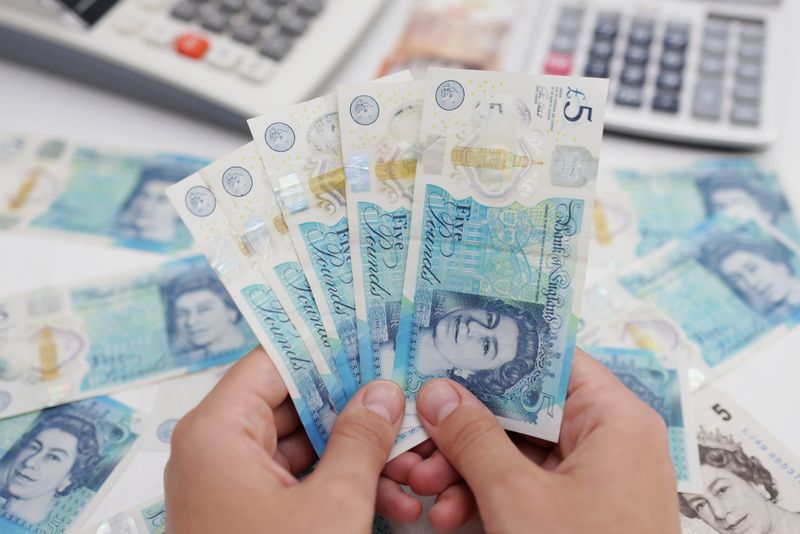By Farouq Suleiman and Harry Robertson
LONDON (Reuters) -The pound was set for its biggest weekly rise in six months on Friday after days of economic data and central bank rate decisions, and ahead of the Bank of England's monetary policy meeting next week.
At 0900 GMT, the pound was at $1.279, up less than 0.1% against the dollar at around its highest level since April. It was up 1.72% since Monday, the biggest weekly increase since early December.
Analysts said a range of factors have boosted the pound against the dollar this week, including data which showed British wages rising far quicker than expected, raising investors' expectations that the Bank of England will have to hike interest rates further.
"Tuesday's labour market data led Bank rate expectations to spend much of that evening flirting with a terminal (peak) rate closer to 6%," said Nicholas Rees, FX market analyst at Monex Europe.
The BoE's main rate currently stands at 4.5%, and on Friday traders expected it to rise to around 5.75% by the start of next year, according to pricing in derivatives markets.
"Markets have in our view become more comfortable with the idea of a higher terminal rate," Rees said. "This shift has provided modest support for sterling over the course of the week."
He said U.S. economic data released on Thursday, which showed weekly jobless claims were higher than expected last week, also helped boost sterling by weighing on the dollar.
Against the euro, sterling was roughly flat at 85.6 pence.
The euro was up 0.2% against the pound for the week, after the European Central Bank signalled further interest rate hikes are likely, as it raised borrowing costs to the highest level in over two decades on Thursday.
The Bank of Japan remained an outlier on Friday to its global counterparts as it continued to pursue a different course, keeping its ultra-loose monetary policy in place.
Sterling rose to its highest level against the yen in eight years following the BoJ's announcement, at 180.83 yen to the pound.
On Thursday next week, the Bank of England is expected to be in lockstep with the ECB, with the market eyeing the chances of a hike of 25 basis points at 88% and 50 basis points at 12%.
The BoE decision comes after the U.S. Federal Reserve also signalled that it could resume tightening its monetary policy after holding rates steady in 5.00% to 5.25% range on Wednesday.
"Investors are sceptical that these central banks can keep hiking interest rates, I think the Bank of England is the exception, because they're backed into a corner with just uniquely problematic inflation outlook," Ben Laidler, global markets strategist at eToro, said.

As Britain's households brace for the effects of more rate hikes, one of the country's largest mortgage lenders, Nationwide Building Society (LON:NBS), said it will increase its fixed rates on home loans offered via brokers.
In recent weeks, mortgage rates have risen in Britain, propelled by expectations of more BoE hikes.